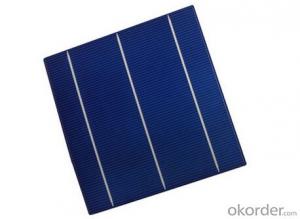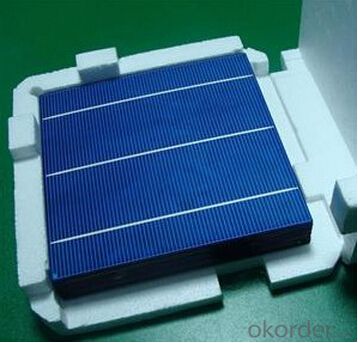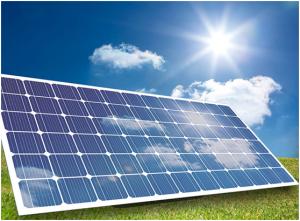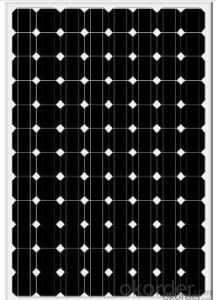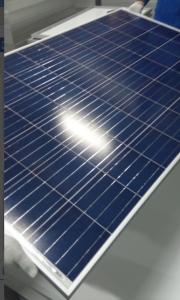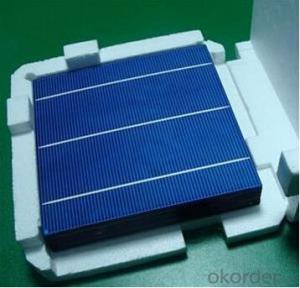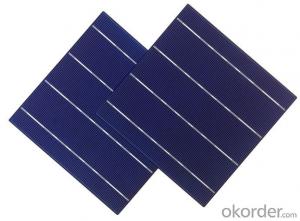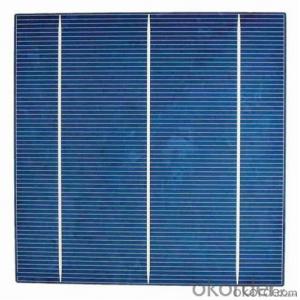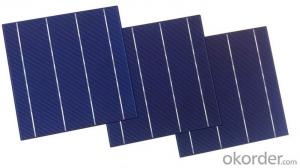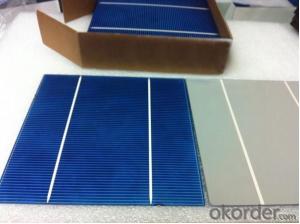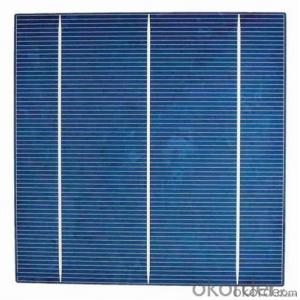Solar Panels in Maine:A Grade and B Grade 3BB and 4BB High Efficiency 18.2% Solar Cells
- Loading Port:
- Shanghai
- Payment Terms:
- TT OR LC
- Min Order Qty:
- 10000 watt
- Supply Capability:
- 100000000 watt/month
OKorder Service Pledge
OKorder Financial Service
You Might Also Like
Specification
1.Product Description:
Specifications of Poly Solar Cells
Dimension | 156mm X 156 mm ±0.5mm |
Wafer Thickness | 200um ±30um |
Front(-) | Four 1.1mm wide bus bars(silver) with distance 39mm, Acid texturized surface with blue silicon nitride AR coating. |
Back(+) | 2.4mm wide silver/aluminum soldering pads, aluminum back surface field. |
Temperature Coefficient of Poly Cells
Voc.Temp .coef.%/K | -0.351%/K |
Isc.Temp .coef.%/K | +0.035%/K |
Pm.Temp. coef.%/K | -0.47%/K |
Electrical Characteristic of Poly Cells
Efficiency code | 1720 | 1740 | 1760 | 1780 | 1820 | 1840 | |
Efficiency (min) | (%) | 17.2 | 17.4 | 17.6 | 17.8 | 18.2 | 18.4 |
Pmax | (W) | 4.186 | 4.234 | 4.283 | 4.332 | 4.429 | 4.478 |
Voc | (V) | 0.631 | 0.632 | 0.634 | 0.636 | 0.640 | 0.642 |
Isc | (A) | 8.446 | 8.485 | 8.523 | 8.573 | 8.660 | 8.700 |
Vmp | (V) | 0.525 | 0.527 | 0.529 | 0.531 | 0.535 | 0.537 |
Imp | (A) | 7.973 | 8.035 | 8.097 | 8.160 | 8.280 | 8.340 |
2.Advantages of Poly Solar Cells
1). Tire-1 Solar Cells’ Manufacturer Quality Guarantee. With a complete and sophisticated quality government system, our Quality Management have arrived world’s leading place. Customer can receive Tire-1 Cells Maker’s Quality Standard Products.
2). Trusted Warranty. We can supply trusted after-sales service to our customer. If our cells are found not in conformity to the specification of manufacturer, or should the inspected quantity found in shortage, or should the packing found damaged, the buyer has the right to claim to the seller. The claim, if any, should be presented to seller within 30 days after cargo's arrival date to the port, together with related inspection report and photos issued and provided by a reputable independent surveyor such as SGS.
3). World’s Leading Manufacturer Equipment. We imported the newest and leading production equipment from abroad. Advanced equipment can guarantee the stable quality of cells. Auto production line can also save labor cost which will further cut our production cost.
4). Bulk supply: With the production capacity of 500MW, we can produce large quantity every month. This can satisfy most customer requirement.
3.Usage and Applications of Poly Cells
Solar cells are often electrically connected and encapsulated as a module.
Photovoltaic modules often have a sheet of glass on the front (sun up) side, allowing light to pass while protecting the semiconductor wafers from abrasion and impact due to wind-driven debris, rain, hail, etc. Solar cells are also usually connected in series in modules, creating an additive voltage.
Connecting cells in parallel will yield a higher current;our solar cells have passed IEC Certification.
With high quality and stable quality. Our Cells can greatly improve the performance of Solar Modules.
4.Pictures of Product
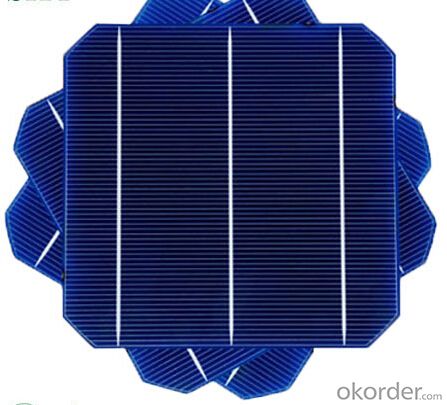
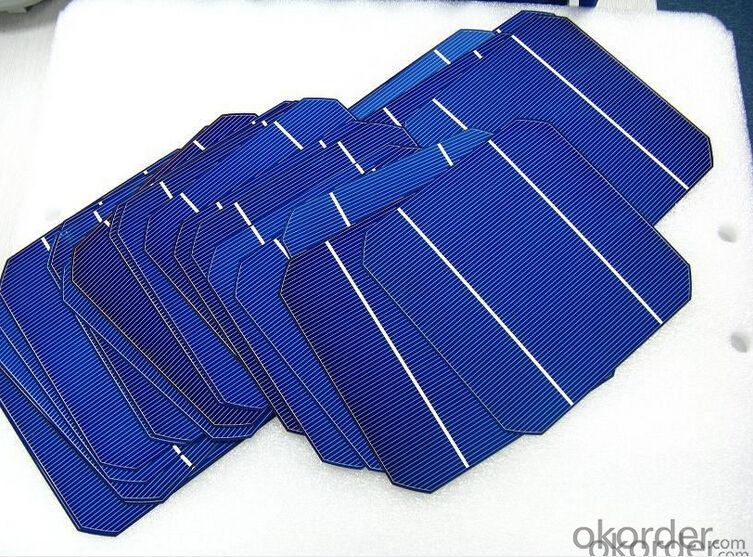
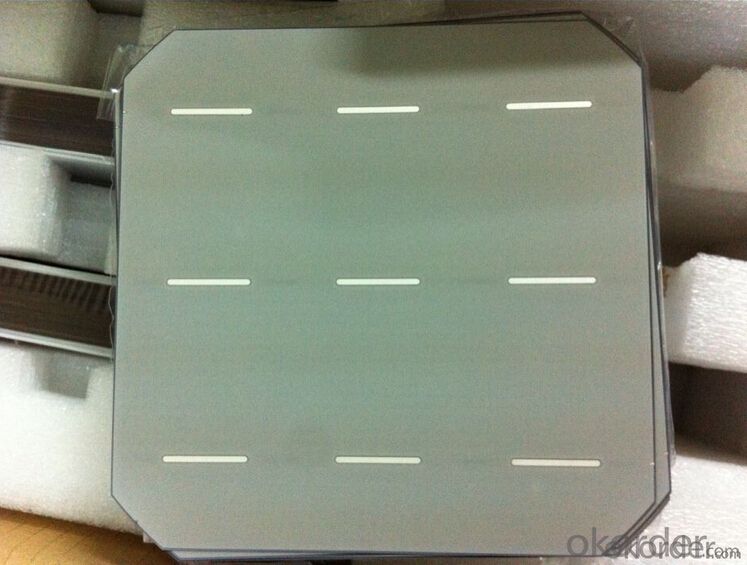
5.Packaging & Delivery of Poly Cells
Carton Box Package and Deliver by air. It should be noticed that it should be avoid water, sunshine and moist.
We have organized several common questions for our clients,may help you sincerely:
6.FAQ
1. What’s price per watt?
A: It’s depends on the quantity, delivery date and payment terms of the order. We can talk further about the detail price issue. Our products is high quality with lower price level.
2. Can you tell me the parameter of your solar cells?
We have different series of cells with different power output, both from c-si to a-si. Please take our specification sheet for your reference.
3. How do you pack your products?
We have rich experience on how to pack the panels to make sure the safety on shipment when it arrives at the destination.
4. Can you do OEM for us?
Yes, we can.
5. How long can we receive the product after purchase?
In the purchase of product within three working days, We will arrange the factory delivery as soon as possible. The perfect time of receiving is related to the state and position of customers. Commonly 7 to 10 working days can be served.
- Q: Can solar panels be used in deserts?
- Yes, solar panels can be used in deserts. In fact, deserts are ideal locations for solar panel installations due to the high levels of sunlight and low cloud cover. The abundance of sunlight in deserts makes them an excellent environment for generating solar energy efficiently.
- Q: Can solar panels be installed on public parks or gardens?
- Yes, solar panels can be installed on public parks or gardens. In fact, installing solar panels in these areas can be a great way to promote renewable energy, reduce carbon emissions, and generate clean electricity to power nearby facilities or feed into the grid. Additionally, solar panels can provide shade for park-goers and enhance the overall sustainability of the space.
- Q: Can solar panels be used to power a military base?
- Yes, solar panels can be used to power a military base. Solar power can provide a reliable and sustainable source of energy for various operations and facilities in a military base, reducing dependency on traditional energy sources and enhancing their efficiency and resilience.
- Q: Can solar panels be installed on a shaded area?
- Solar panels are most effective when placed in direct sunlight, so installing them in a shaded area would significantly reduce their energy production. However, there are technologies available, such as bifacial solar panels or solar trackers, that can optimize energy generation in partially shaded areas.
- Q: I made three 36 solar cell (3x6 .5V 3.5A) panel and had it hooked a up to an old car inverter. I was on line looking for a cheap grid tied inverter. I came across the Enphase micro inverter and was wondering if i could use one of those. Will it work?
- Build okorder
- Q: Do solar panels work at night?
- No, solar panels do not work at night as they require sunlight to generate electricity.
- Q: I am looking at a need of roughly 30w/hour need per 24 hour period. I have spent several hours now looking for information online and have found plenty of info regarding the panels themselves, but information regarding the batteries backups have been slim. I understand that there is a 5-7 hour peak time to collect the energy. I am looking for information regarding the batteries themselves. How do the batteries work, what size batteries should I look for, and what is the life expectency for the batteries? Any website links would also be appreciated!
- First, you didn't say the voltage. Second, 30 W/hour per day. Third, battery backup capacity in Ah = Ampere hour. For 2 Volt DC here's the calculations : 30 w/hour means = 0.83 or rounded Ampere hour. You know peak time 5-7 hour (let say 6 hour)charging time (collect the sun energy). Ampere hour per day (24 hour), with 20 Ah Battery backup is OK. And the Solar Panel is 3 Ampere charging capacity minimal = 3 Amp x 6 hour = 8 Amp hour.
- Q: Can solar panels be installed on agricultural or farming operations?
- Yes, solar panels can be installed on agricultural or farming operations. In fact, many farmers and agricultural businesses are increasingly adopting solar energy as a sustainable and cost-effective solution to power their operations. Solar panels can be mounted on rooftops, open land, or even on barns and sheds, providing clean and renewable energy to offset electricity costs and reduce carbon emissions. Additionally, solar panels can help farmers take advantage of unused or underutilized land, providing dual benefits of energy generation and agricultural productivity.
- Q: My family moved into a house that came with solar power panels but they are not connected and don't really understand how to even begin.
- You need to know some electrical basics. You need to check if they are still working and determine the output voltage with the use of testers. They are just part of a system that includes other equipments as well like a controller, car batteries, inverters, diodes.
- Q: China is the world's biggest producer of solar panels
- Go ahead admit it...Carter was right ! He was right in seeking to raise the fleet auto mileage standard to 48 miles per gallon by 995. (Even U.S. automakers admitted at the time that they could easily achieve 30 mpg by 985.) Carter was right in exhorting Americans to turn down their thermostats, even if he did look nerdy in a cardigan while urging us to do so. He was right to encourage fuel conservation by proposing a 50-cents-per-gallon tax on gasoline and a fee on imported oil —- in effect, a floor for fuel prices. Invoking the pioneering spirit of the 960s moon mission, he was right to recommend a tax on windfall oil profits to finance a crash program to develop affordable synthetic fuels. Carter was correct, too, in setting a goal of obtaining 20 percent of our energy from solar power by the year 2000. The solar panels Carter put up on the Whitehouse were USA made. The solar
Send your message to us
Solar Panels in Maine:A Grade and B Grade 3BB and 4BB High Efficiency 18.2% Solar Cells
- Loading Port:
- Shanghai
- Payment Terms:
- TT OR LC
- Min Order Qty:
- 10000 watt
- Supply Capability:
- 100000000 watt/month
OKorder Service Pledge
OKorder Financial Service
Similar products
Hot products
Hot Searches
Related keywords
